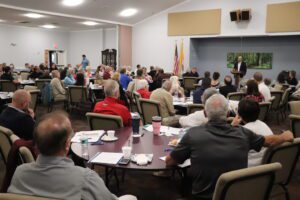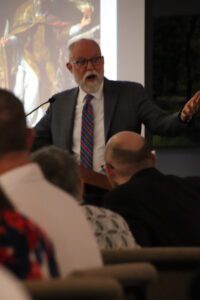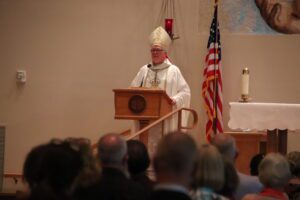The Diocese of Venice Office of Evangelization teamed up with the Augustine Institute to provide a day of formation and renewal for 120 Parish and Catholic school leaders.
This special day, with a theme “You Go into the Vineyard Too” (Matthew 20:7), took place Jan. 13, 2024, at Sacred Heart Parish in Punta Gorda. Bishop Frank J. Dewane offered the opening prayer, and was the main celebrant at Mass.

Bishop Dewane said the Gospel reading for the day (Mark 2:13-17) was apropos for the gathering. This Gospel message related how Jesus saw Levi (the Apostle Matthew, the tax collector), sitting at the custom post. “Jesus said to him, ‘Follow me.’ And he got up and followed Jesus.” Later, when the Pharisees asked the disciples why Jesus was eating with sinners and tax collectors, “Jesus heard this and said to them, ‘Those who are well do not need a physician, but the sick do. I did not come to call the righteous but sinners.’”
Whether one serves the Catholic Church in a Diocesan Parish or Catholic school, Bishop Dewane said, the Lord says “Follow Me” to all of us.
“And the response we give is shown in the way we live our lives,” the Bishop said. “Jesus said two short words to Matthew, ‘Follow me.’ With a few words, Mathew is set free from self-hatred as a tax collector. These are words of mercy, because the Lord knows who Matthew is, and what he has done. Then the mercy washes over Matthew. It changed his world.”

While each of the leaders present at the training day have stepped forward to do the work of the Lord in the Parishes and schools, Bishop Dewane said they must each continue to answer that call in their daily lives.
“Find the forgiveness of the Lord; find the Mercy of the Lord, and appeal to Him,” the Bishop said. “We need to give that same mercy to others. In a sense, pass it on. We do it in faith; we do it in the love of the Lord; we do it in the hope of the promise of Salvation.”
Jim Gontis, Diocese of Venice Director of Evangelization, said the day was designed to assist those in Parish and Catholic school leadership to live out and convey the mission of the Church and the work of evangelization central to that mission.
Among those participating were priests, school principals, directors of religious education, youth directors, teachers, and religious education instructors.
The day focused on reminding the Parish and Catholic school leaders that as disciples of Christ, they must continue to learn through the reading of Sacred Scripture and be nourished by God’s word.
One school leader remarked how it is important to remember to always strive to grow closer to the Lord, and this can be done by gaining a better understanding of one’s place in Salvation History.

A Parish leader said it was good to reflect on the love and mercy that the Lord provides each of us, as it can fade into the background of daily life. Each speaker offered a step in the process of finding that love and mercy in the Bible, the Catechism of the Catholic Church, and through the Sacraments.
“Being a disciple is not a static thing,” said Dr. James Prothro, of the Augustine Institute. “We must see ourselves as part of the ongoing story of Salvation History as told to us in the Bible. The Word of God must give us meaning. When we read the Bible, it must drive our life, in prayer, in service, and in love of God.”
Prothro also focused on the healing benefits of the Sacrament of Reconciliation, which offers forgiveness and restoration for those who falter, “which is a category we each fall into.”
Dr. Sean Innerest, also of the Augustine Institute, spoke about reengaging in in the Catechism of the Catholic Church, explaining how the structure and content of the Catechism show us how a deeper engagement with our faith will yield an increase in hope and love for ourselves and those who we service.
Innerest also spoke about the “National Eucharistic Revival,” the ongoing initiative of the U.S. Bishops to build a greater appreciation for the Most Holy Eucharist, in the context of mystagogy. This ancient form of liturgical catechesis shows us how to build that appreciation effectively; to heighten Eucharistic faith by moving from mere “facts” to “fascination” in the Real Presence of Jesus in the Blessed Sacrament.





